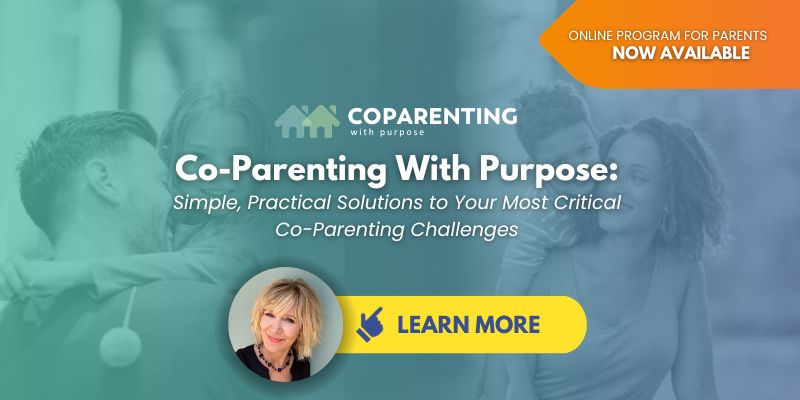What every parent needs to know about helping kids cope with divorce

Helping kids cope with divorce.
7 minute read
When I coach parents about how to help their children cope with divorce, one of the first questions they often ask is “What do I say?” or “How can I talk about this?” And it’s not just that first big talk parents are losing sleepover. There are an endless number of situations that leave parents grappling for the right words.
Marlene had an affair and wants to know what she should say to her teenage kids to keep them from being angry with her. Joel has a serious girlfriend and wants to tell his 10-year-old he’s seeing someone. How can he break the news without making him upset? Six-year-old Javier is devastated because Mom didn’t show up for her weekend again. Dad wants to know what he should say to keep him from being sad. Celeste’s Ex is an alcoholic and abuses drugs, how does she explain to her children that they can’t spend time with their father?
Understandably, lots of parents want to shield their kids from the hurt. However, what most of us overlook is that those feelings we desperately want to dodge or protect our kids from are necessary.
While having the “right “words can be important when tough times hit, parenting your kids successfully through a divorce isn’t just knowing what to say and when to say it. Sometimes it’s about knowing when to listen, being open to what your kids have to say and supporting how they feel by letting them know those feelings are understandable.
In a nutshell, listen more. Talk less.
Sounds simple right?
Actually, it’s not.
While listening seems pretty straightforward, doing it well takes a lot of practice. In today’s uber-busy ever distracted world, it’s super easy to hear but not listen. I’ve spent most of my career being a professional listener and I still catch myself only half-listening (just ask my husband and my kids!)
The art of listening is more than just hearing what is being said. It’s a process that involves trying to understand another person’s perspective while letting go of your own judgments/thoughts. And if we do it well, we also manage to validate that person’s feelings. Of course, there are lots of landmines we encounter along the way.
Like those times when your kid says something that’s really hard for you to hear like “Your rules suck, I don’t want to live with you anymore!” While every bone in your body is screaming, “Oh no, you did not just go there,” it’s often more helpful to bite your tongue, lean in and listen while keeping your feelings in check.
Other times you may be physically there, but mentally checked out and not giving your children your full attention. This is when listening gets lost somewhere between emptying the dishwasher and responding to a crisis text from work. In those moments, you may need to put away your phone and sit knee to knee with your child to fully hear what they’re saying.
Other times the shoe may be on the other foot. You’re dying to hear what your kids are thinking and feeling but they’re not talking.
No matter how the situation plays out, being an available parent and fine-tuning your listening skills plays a vital role in how children adjust to divorce.
If you’re interested in upping your listening game, here are a few pointers to keep in mind.
Keep the lines of communication open.
Instead of waiting for a crisis to happen, make a habit of regularly checking in with your kids to find out what’s going on in their world.
To get started:
Set Aside Time
Block out 15 to 20 minutes a day or a couple of times a week to touch base with your kids. To make sure that time doesn’t get eaten up by everyday life, try hooking it to something you do every day. Maybe your check-in time is during the ride home from school. Perhaps when you’re putting them to bed, you can linger and listen. Other kids tend to talk more when you engage them in an activity like, taking a walk, sitting on the floor to color or kicking a ball around. The key is to choose a time when both you and your kids can be distraction-free (i.e., no screens, no phones, no video games)
Remember every conversation doesn’t have to involve them purging their soul. The goal is to let your kids know what they are thinking and feeling matters to you and that you are there for them.
Get curious and ask open-ended questions
One way to improve your listening skills is by being curious and asking simple questions such as:
- How do you feel about what Mom/Dad said?
- Help me understand what’s going on?
- What do you think would help? How can I help?
- How long have you felt this way?
- On a scale of one to ten, how (mad, sad upset, etc.) are you?
Resist the urge to fix it or offer advice
When kids are hurting or say something that hits you hard, it can be a real challenge not to shift into fix-it mode, offer words of wisdom or try to put a positive spin on the situation. Remember, what children need is for you to understand the situation, not solve it.
Having your attention and feeling heard is not only tremendously validating for kids but it also strengthens your relationship with them.
Let them know you “get it.”
Along with hearing what’s been said, kids need to know that you understand how they are feeling. Letting kids know you “get it” is an essential component of validation. To be honest, this is where a lot of us get tripped up.
Validating your children doesn’t mean you have to agree with what’s being said or how they feel. It simply means you make an effort to see the situation through your children’s eyes.
For example, imagine six-year-old Maci has a major meltdown because she left her favorite stuffed animal at Dad’s house. Instead of launching into all the ways she can avoid forgetting it next time, you take a different approach. After hearing her out, it might be more helpful to say something like, “I can tell your stuffed animal is very important to you. It must really hard not having things where you want them.
Give them options
Although you may be doing your best to support your children’s feelings and be a good listener, that doesn’t mean you’re always the ideal person for them to talk to about difficult issues. Kids often have a lot of unspoken worries about how their feelings and choices will affect their parents.
Sometimes kids worry that sharing how they feel might:
- Hurt a parent’s feelings
- Make things worse
- Start an argument between Mom and Dad
- Make a parent angry
- Cause a parent to stop seeing them
- Leave a parent feeling betrayed
When parents aren’t getting along, kids often feel the pressure to filter what they say or hide how they feel.
Suppose Lily’s room at Dad’s house feels a little scary at night and she has trouble sleeping. Lily worries that if she tells Dad, he’ll get angry and think she likes Mom’s house more. If she tells Mom, Lily is concerned Mom will think it’s Dad’s fault and start another fight.
The end result? Lily stays quiet to keep the peace and continues to feel uncomfortable sleeping at Dad’s.
Make sure your kids have the support they need by:
- Reassuring them, it’s okay to talk and ask questions.
- Being open to hearing what they have to say (even when you don’t agree or have a different perspective.)
- Letting them know it’s okay to talk to others.
- Helping them identify safe adults they can turn to for advice and support. Good people for kids to talk to might be a grandparent, a favorite aunt or uncle, a family friend, teacher, coach or clergy.
Regardless of the reason, if you feel your kids are struggling, feel caught in the middle or have something weighing heavy on their minds, consider getting help from a local professional (i.e., Counselors, therapist, groups for kids or a support group for parents)
When to look for help
And while we’re on the topic, if you’re wondering whether or not you should put your kids in counseling, you’re not alone. Lots of parents are curious about when and if they should seek professional help for their children. Although there are benefits to therapy for kids, keep in mind, divorce is a change in a family, not a disorder. Unless circumstances are severe or toxic (i.e., high conflict, domestic abuse, addiction, alienation, etc.) before taking your child to see someone, I would encourage you to consider making an appointment for yourself.
Often with professional guidance, parents can learn the skills they need to make important changes for their kids. In the case where therapy is needed, meeting with a professional first, gives you a chance to evaluate whether or not they’re a good fit for your child and your family.
One on one isn’t the only option either. Kids can also benefit from groups when parents split that focus on teaching coping skills and problem-solving. Consider checking with your children’s school or a local counseling organization to find out what might be available in your area.
If you decide to look for a counselor, seek out someone with qualifications that match your needs. For example, if your kids are getting caught in the middle of fighting, look for someone who has experience in dealing with high-conflict divorce. For situations that involve addiction or abuse, look for a therapist who is qualified to help families cope with those issues.
THE CHALLENGE
Over the next week, pay attention to what you do when your children talk about how they feel.
- Do you try to fix the problem or offer advice?
- How easy or hard is it for you to just listen?
- Do you respond the same way every time or are there certain feelings/issues that are more difficult for you to manage?
- How do your children respond to the way you listen?
- What could you do to become a better listener for your children?
At the end of the week, take note of what you discovered and consider what you could do to up your listening game.
Do you have a story to share? How did you get better at listening to your kids? Share your tips and thoughts with other members in our parenting community below.
Feeling overwhelmed by divorce? You don’t have to be, learn how to:
- Coparent with confidence.
- Establish a new normal.
- Minimize effects for your kids.
- Handle conflict like a pro
Find out more about coaching and how to schedule a FREE 30-minute consultation with Christina. **Limited availability, schedule now to reserve your spot!
x,
Christina





